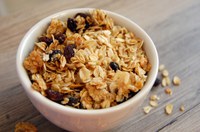Prairie Fare: Cancer Screening Can Save Your Life
(Click an image below to view a high-resolution image that can be downloaded)
By Julie Garden-Robinson, Food and Nutrition Specialist
NDSU Extension
“A box arrived for you this afternoon,” my husband said.
I was not expecting a box.
“Is it a small box or a big box?” I asked.
Maybe it was a late Christmas gift, I thought to myself.
“It’s a medium-sized box,” he replied.
I saw the box on the table inside our front door. I recognized the little cartoon character, which was shaped like a box with arms and legs. I had seen the box fly in and out of homes on TV.
This was the colon cancer screening test my health-care provider had ordered for me because I’m of average risk for colon cancer. It did not have a Christmas bow on the box.
I checked the weight of the box: 3 pounds.
My husband had a clever quip when he saw my wide eyes at the size and weight of the box. You will have to ask him what he said because I can’t print it here.
OK, his remark had to do with the sample size they were expecting.
I opened the box and read the illustrated directions. I noted the test detects cancer and precancer using the DNA in a stool sample. In a clinical study of 10,000 people, the testing method detected 92% of cancer for those of average risk.
I continued to pack a suitcase to leave for a conference the next day. I decided to do the test when I returned.
Sometimes you can’t “decide” to do a colon cancer screening test; your body decides for you.
Our phone rang when I returned from my conference. I saw the call was coming from the screening test manufacturer, and I looked over at the box on the shelf. They were nudging me to get it done.
I answered the phone and was prompted by an automated voice that accepted voice responses.
“Yes” I received the kit. “Yes” I planned to do the test. “No” I didn’t need help.
Were they planning to send someone over to help? Or would a virtual assistant pop up on my phone to guide me through the process? Fortunately, no.
I carefully followed the sampling directions. The manufacturer thought of everything to make this easy.
The kit included a sample collection device that reminded me of the plastic insert I had used years ago to train three toddlers how to use a toilet. To complete the test, you collect your sample, add the chemical stabilizer, seal the plastic container and immediately mail it back.
I received an email message from my provider a few days later. My heart was beating fast. Would they send me really bad news in an email? My life flashed before my eyes.
I figured they would call instead of email if the news was grim. I opened the message right away. Hooray! The results were negative. I wanted to dance a little jig around the house.
However, if the results of the cancer screening test had been positive, then I would be having more tests and, potentially, be placed on a treatment plan. Being aware of health issues can save your life.
Don’t die of embarrassment. I encourage people to do a colon cancer screening test and all other health screening tests recommended by your health-care provider. March is National Colorectal Cancer Awareness Month.
According to the Centers for Disease Control and Prevention, colorectal cancer is the second leading cause of cancer deaths in the U.S. More than 90% of colorectal cancers occur in people age 50 and older. Screening should begin at age 45, according to the latest guidance.
About one-third of people are not up to date with their screenings. Are you among them?
Your provider might recommend a colonoscopy that allows the detection and removal of polyps. Or your provider may recommend an at-home stool test or another clinical test.
Be aware that colorectal cancer does not cause symptoms right away. If you have symptoms, such as blood in the stool, stomach pain that doesn’t go away or weight loss without a reason, make an appointment to see your health-care provider promptly.
We cannot change our genetic tendencies toward diseases, but we can take steps to reduce our risk for cancer and other diseases through exercise, proper nutrition, not smoking and regular medical care. We in nutrition recommend that your diet includes foods high in fiber such as beans and other legumes, vegetables, fruits and whole grains such as oatmeal and whole-wheat bread. See https://www.ag.ndsu.edu/food for more information about nutrition and fitness.
Here’s a tasty snack to make in a slow cooker. Oats are high in fiber, which promotes a healthy colon and a healthy heart.
Slow Cooker Honey Granola
4 c. old-fashioned oats, uncooked
6 Tbsp. honey
1/2 c. flax seeds
1 c. bran cereal
1 c. raisins
1/4 c. canola oil
Pour all ingredients into a 6-quart slow cooker and mix well. Put the cover on a little bit askew and cook on low for about three hours, stirring occasionally. Let cool on parchment paper and store in an airtight container for one to two weeks.
Makes 24 servings. Each (1/4 cup) serving has 130 calories, 4 grams (g) fat, 3 g protein, 23 g carbohydrates, 2 g fiber and 10 milligrams sodium.
(Julie Garden-Robinson, Ph.D., R.D., L.R.D., is a North Dakota State University Extension food and nutrition specialist and professor in the Department of Health, Nutrition and Exercise Sciences. Follow her on Twitter @jgardenrobinson)
NDSU Agriculture Communication - Feb. 27, 2020
| Source: | Julie Garden-Robinson, 701-231-7187, julie.garden-robinson@ndsu.edu |
|---|---|
| Editor: | Ellen Crawford, 701-231-5391, ellen.crawford@ndsu.edu |



